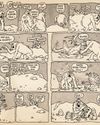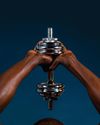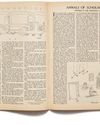
Scientists in Texas have created "molecular machines" that drill into bacteria.
Ana Santos, a microbiologist at Rice University, grew up in Cantanhede, a small city in Portugal that is known as a biotechnology hub and a source of good wine. When she was a child, her grandfather, who bound books for a living, was an energetic man who often rode his bicycle around town. But by 2019, his health had deteriorated and he depended on a catheter. One day, he spiked a fever; doctors found that his urinary tract was infected with a highly drug-resistant form of Klebsiella pneumoniae, a bacteria that is commonly found in the gut. None of their antibiotics could treat it. A few days later, he died. “There was literally nothing they could do for him,” Santos told me recently, fury in her voice. “A simple bacterial infection kills him? I thought medicine had dealt with that.”
At the time, Santos was at the Centre for Interdisciplinary Research in Paris, studying genes that allow some bacteria to live longer than others. But after her grandfather’s death she decided to focus instead on new ways of killing pathogens. One problem with traditional antibiotics is that bacteria, which are always evolving, can develop resistance over time. To stay competitive in the arms race between bacteria and biotechnology, Santos reasoned, scientists might need entirely new weapons. She read in Nature that scientists at Rice, led by the chemist James Tour, had developed “molecular machines” that spun like microscopic drills and were roughly ten thousand times smaller than the width of a human hair—small enough to puncture and kill individual cells. Shortly thereafter, Santos moved to Houston to join Tour’s lab.
This story is from the {{IssueName}} edition of {{MagazineName}}.
Start your 7-day Magzter GOLD free trial to access thousands of curated premium stories, and 9,000+ magazines and newspapers.
Already a subscriber ? Sign In
This story is from the {{IssueName}} edition of {{MagazineName}}.
Start your 7-day Magzter GOLD free trial to access thousands of curated premium stories, and 9,000+ magazines and newspapers.
Already a subscriber? Sign In

SUBJECT AND OBJECT
What happened when Lillian Ross profiled Ernest Hemingway.

ROYAL FLUSH
The fall of red.

Roz Chast on George Booth's Cartoons
There's almost nothing I like more than a laughing fit. It is a non-brain response, like an orgasm or a sneeze.

CHUKA
I have always longed to be known, truly known, by another human being. Sometimes we live for years with yearnings that we cannot name.

Rachel Aviv on Janet Malcolm's "Trouble in the Archives"
As Janet Malcolm worked on \"Trouble in the Archives,\" a two-part piece about prominent psychoanalysts who disagreed about Freud, she began a correspondence with Kurt Eissler, the head of the Sigmund Freud Archives.

PERSONAL HISTORY - A VISIT TO MADAM BEDI
I was estranged from my own mother, so a friend tried to lend me his.

AMERICAN CHRONICLES - WAR OF WORDS
Editors, writers, and the making of a magazine.

LIVE FROM NEW YORK
A new docuseries commemorates fifty years of \"Saturday Night Live.\"

TANGLED WEB
An arachnophobe pays homage to the spider.

TROUBLE IN PARADISE
Mike White's mischievous morality plays.